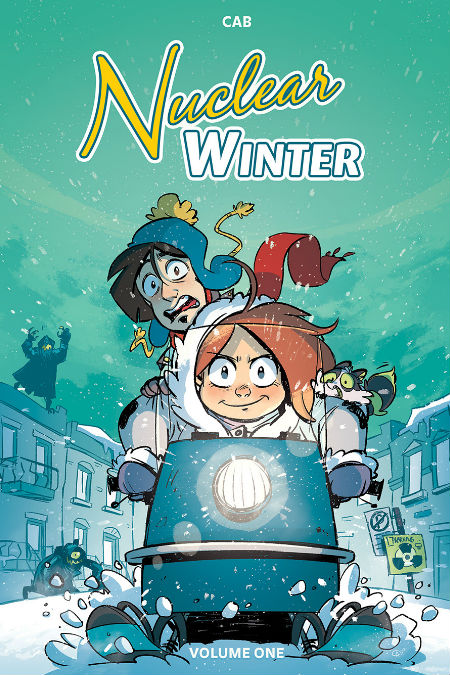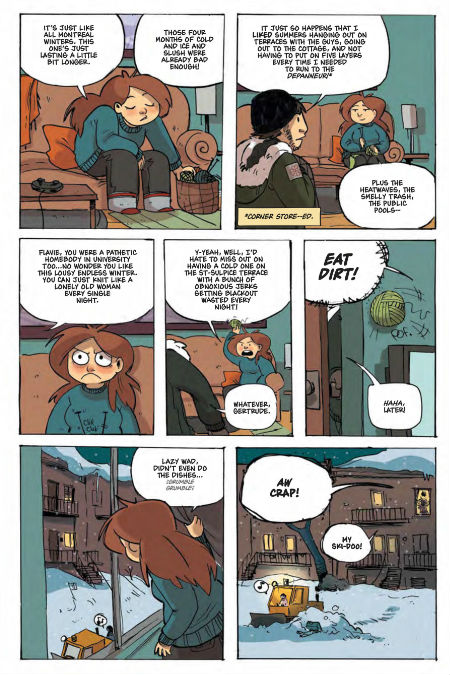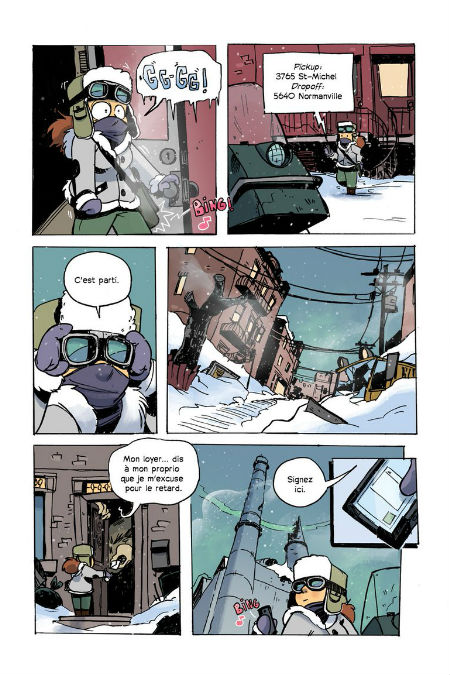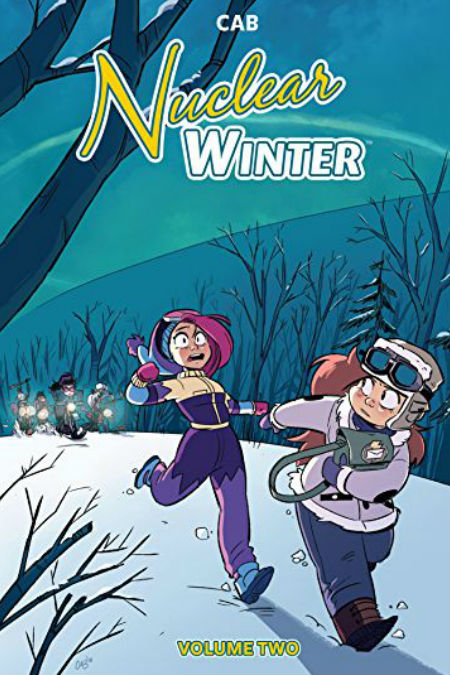
Ordinarily, an apocalyptic event like a nuclear winter wouldn’t form a lasting premise for a quirky, character-based comic that surges with wit, whimsy and more than a little action (much of it on ski-doos as it happens).
But in Nuclear Winter (Hiver nucléaire) by Montreal-based artist Caroline Breault, known by simply by the abbreviated moniker CAB, who rather ironically is not a fan of the colder months, it is not only a superb premise but one that is executed on in a way that brings a whole lot of rich humanity to the fore.
Focusing on delivery driver, Flavie Beaumont, who is one of the few drivers out there willing to brave the mutant animal-full reaches of Mont Royal, which towers over the city, and the outer snowy reaches which the government has long since surrendered to the unlivably-high reaches, this delightful graphic novel examines what happens to a city and its people when the explosion of a nuclear power plant sometime in the near-ish future creates a localised decade-long winter.
Keeping in mind that there is radiation aplenty strewn about and constantly falling, which affects everyone in different ways – Flavie’s blood is constantly super hot, a condition alleviated only by iodide, which like most things is in short supply in the snowbound conurbation, and when she gets angry? Well, let’s just say she’s a tad Hulk-like in action, if not appearance – this is a robustly-quirky world that is at once very normal with people working jobs, getting groceries and going out to clubs, and quite unusual.
Take the cafe Flavie goes to at one point where she, with close buddy Leonie Martin, who has 3,587 friends on Facebook and is a vegetarian, except for shawarma, meet the impossibly-hip and very handsome Marco Castello who inhabits coffee shops, bookstores and bistros.
Food and coffee is served, the waiter has attitude and brunch is a thing; so much, same-same.
But look a little closer, and you’ll spot a short-order cook with a cyclops-lile mono-eye, a pudgy man with a melted-misshappen head and a garrulous diner chatting with his female companion who can take in all her beauty with his three eyes.
Yep, this is not your typical clientele, and indeed the people of Montreal, which, while the dialogue is presented in English is presented with signs, shop shelf-talkers etc all in French, are all affected by the radiation in one way or another, with the homeless men, who are outside the most, almost getting abominable snowmen-like in their appearance and behaviour.
The idea is that the longer you’re out, the more your body mutates, and as a delivery driver catering to the increasingly outside-averse citizens of Montreal, Flavie is out there a lot, even on her days off which, thanks to her dedication and bravery as a driver, is a considerable amount.


But it’s what happens inside that is the most enjoyable to take in (although it has to be said that artwork across the board is a joy, bringing Montreal, even clad in eternally-deep snow to life in ways dramatic and mysteriously-fun).
Although Nuclear Winter (Hiver nucléaire) is set in a localised-wintery apocalypse, people in the rest of the world including Flavie’s divorced mum and dad are touring wine country in the Napa Valley, taking holidays in Spain and in general, going about life as if nothing untoward has happened to Montreal.
To be fair, that is largely how the citizens of the city have taken to their wholly strange new situation, one in which giant glowing eyed-polar raccoons and similarly-sized squirrels of unusual size (very The Princess Bride-like in appearance to my great pleasure), and so we get to see Flavie trying to make things work with her domesticity-phobic flatmate, finding momentary happiness in a snack and a coffee, and enjoying her ever-more flirtatious encounters with Marco who, oh happy rom-com moment, is not as hip or unapproachable as he first appears.
Even Flavie’s younger wayward sister Elsie, who may have been running with the wrong, cough syrup-smuggling crowd, has a few good qualities, okay a lot in fact, and so much of the storytelling centres the people who try to make life work in a city which is one foot into a syfy five-season apocalyptic series.
They are delightful people, who are real and very human despite their unconventional urban setting, and it is they who make this thoroughly,, refreshingly offbeat premise really fly in a comic which, the artist explains on the Nuclear Winter site, is also a love letter of sorts to her hometown.
“This comic is an homage to Montreal’s winters and features a lot of landmarks (the mountain in the second panel is Mont Royal), local foods, cultural references and other “inside jokes”. Why not get to know the city a little better? Also, as a disclaimer, I decided not to translate road signs, panels and other pieces of text in the comic. Why? First of all, it’s long. Second of all, even though this is the english version, my characters are all francophones. The fact that it is translated does not mean they speak English! I will of course explain things in here, but I just wanted to say, don’t panic if there are things you don’t get in the panels!”
Plunging into the Nordic Alleycat rife world of Nuclear Winter (Hiver nucléaire) is truly one of life’s great pleasures.
Montreal, for all its bleak frigid winteryness, is shown as a beautiful, cosmopolitan, tenacious city with inhabitants who just get on with things; not always perfectly, of course, because who does, especially when an exploded power plant has made life an irradiated, unpredictable mess of the weird and the absurd.
Most of all, this gem of comic book storytelling has fun getting down and gritty and whimsically heartfelt with its beguiling characters, all of whom, but Flavie most of all, have stuck to their existential guns, weather be damned, in the best demonstration yet of the human spirit and our desire to have coffee and bagels in half an hour, snowy apocalypse be damned!
